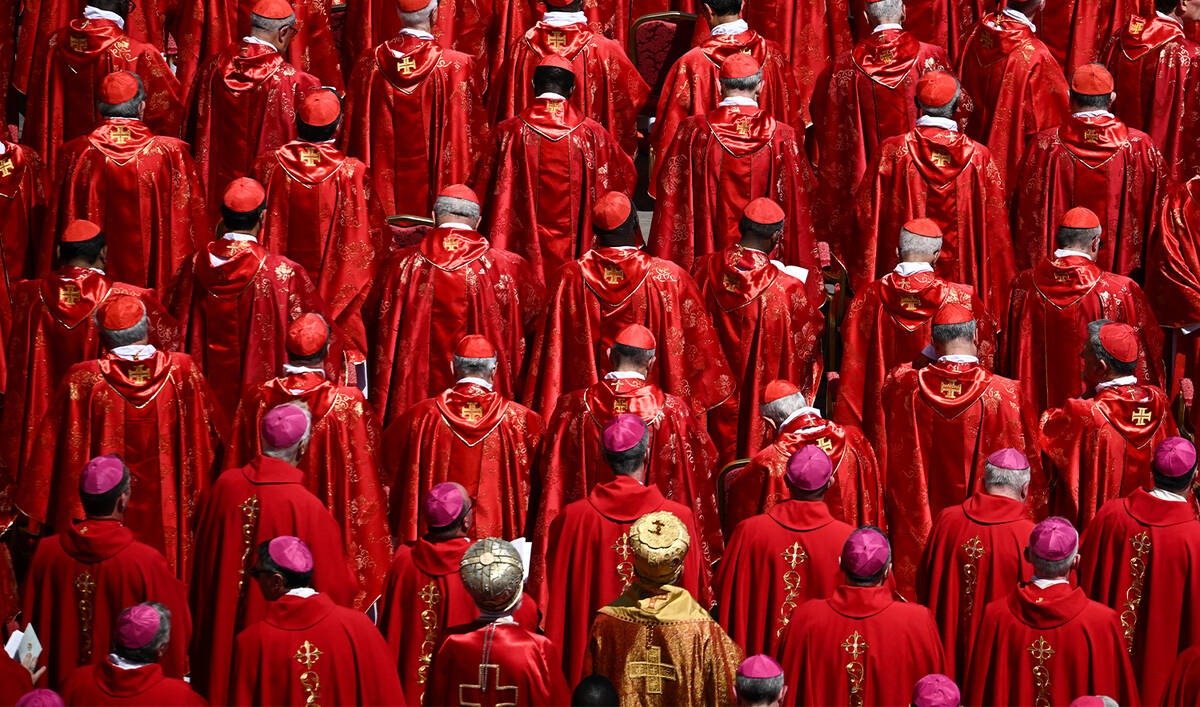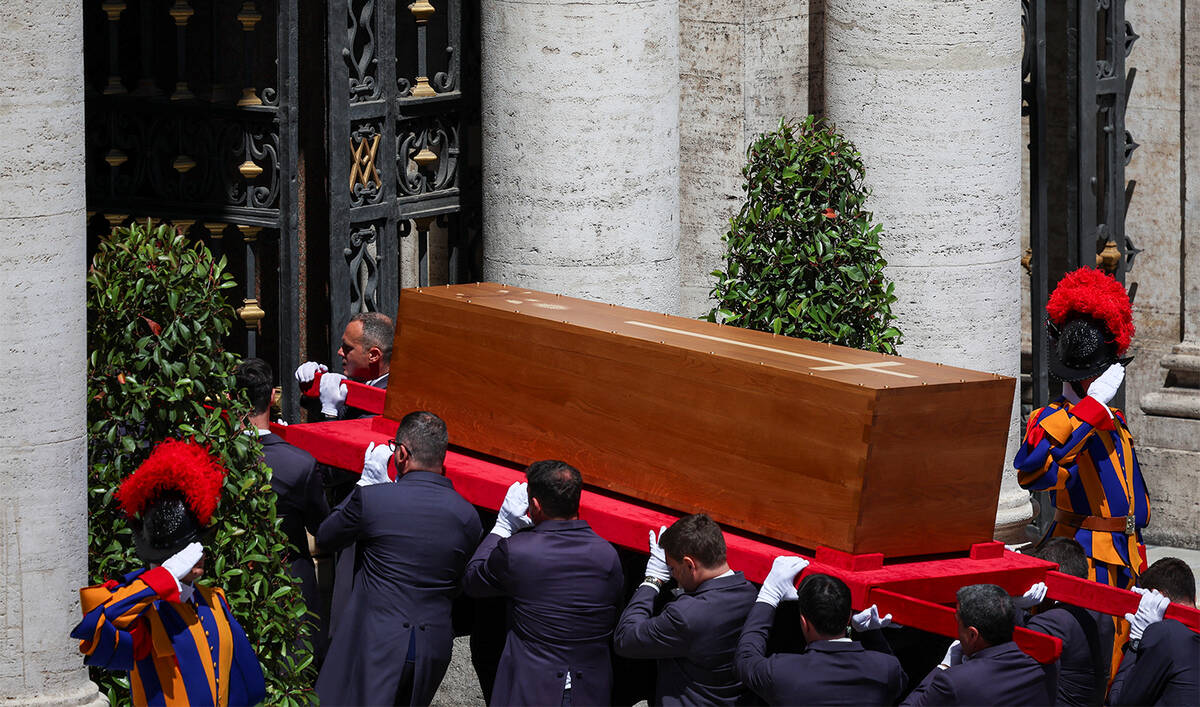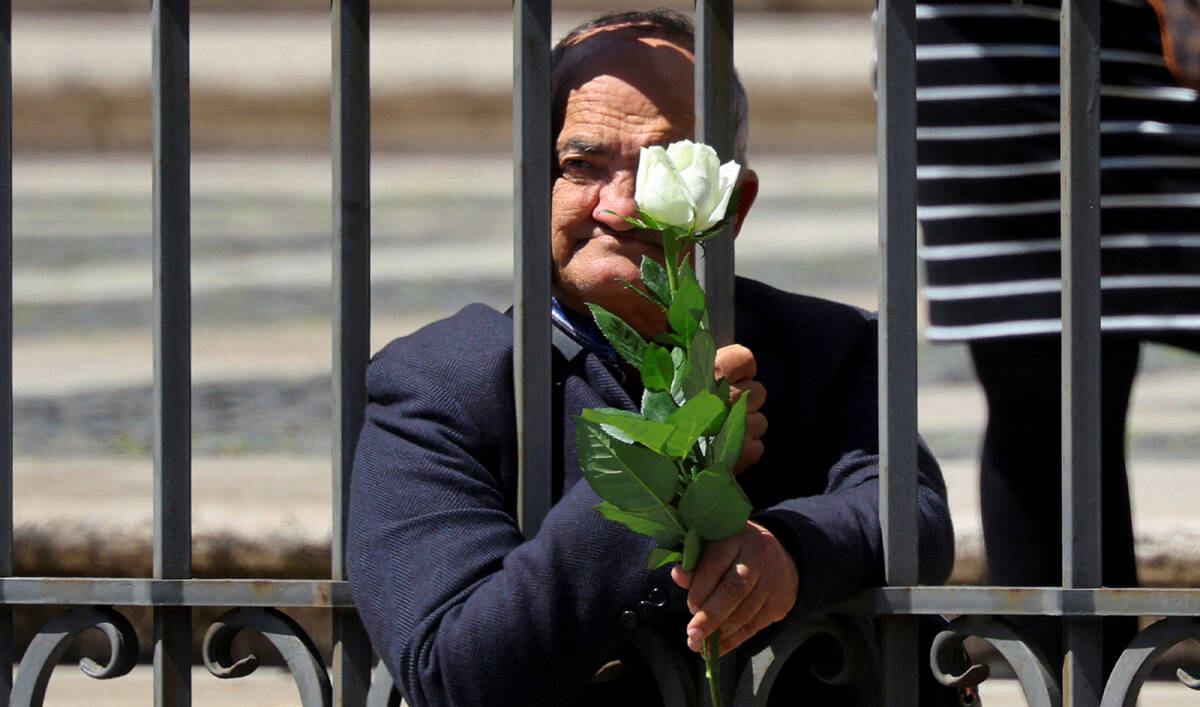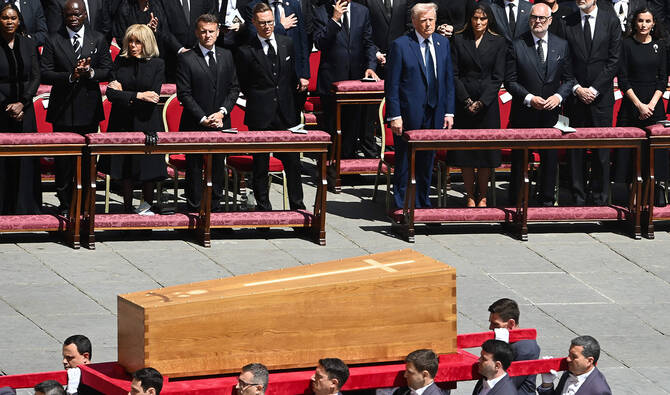Vatican City: Hundreds of thousands of mourners and world leaders, including US President Donald Trump packed St. Peter’s Square on Saturday for the funeral of Pope Francis, “pope among the people” and the Catholic Church’s first Latin American leader.
Some waited overnight to get a seat in the vast square in front of St. Peter’s Basilica, with the Vatican reporting some 250,00 people attended, in an outpouring of support for the Argentine pontiff.
More than 50 heads of state were also present at the solemn ceremony, including Trump — who met several world leaders in a corner of the basilica beforehand, notably Ukraine’s Volodomyr Zelensky, in their first face-to-face since their Oval Office clash in February.
The crowds applauded as the pope’s coffin was carried out of the basilica by white gloved pallbearers, accompanied by more than 200 red-robed cardinals, and then again as it was taken back after the approximately two-hour mass.
Francis, who died on Monday aged 88, was “a pope among the people, with an open heart,” who strove for a more compassionate, open-minded Catholic Church, Cardinal Giovanni Battista Re said in his funeral homily.
There was applause again from the masses gathered under bright blue skies as he hailed the pope’s “conviction that the Church is a home for all, a home with its doors always open.”
Francis sought to steer the centuries-old Church into a more inclusive direction during his 12-year papacy, and his death prompted a global outpouring of emotion.
“I’m touched by how many people are here. It’s beautiful to see all these nationalities together,” said Jeremie Metais, 29, from Grenoble, France.
“It’s a bit like the center of the world today.”

Members of the clergy attend the funeral Mass of Pope Francis, at the Vatican, on April 26, 2025. (REUTERS)
Italian and Vatican authorities mounted a major security operation for the ceremony, with fighter jets on standby and snipers positioned on roofs surrounding the tiny city-state.
After the funeral, the pope’s simple wooden coffin was put onto a white popemobile for a slow drive through the streets of Rome to the basilica of Santa Maria Maggiore, where he will be buried.
The funeral sets off the first of nine days of official Vatican mourning for Francis, who took over following the resignation of Pope Benedict XVI in 2013.
After the mourning, cardinals will gather for the conclave to elect a new pope to lead the world’s 1.4 billion Catholics.
Many of Francis’s reforms angered traditionalists, while his criticism of injustices, from the treatment of migrants to the damage wrought by global warming, riled many world leaders.
Yet the former archbishop of Buenos Aires’s compassion and charisma earned him global affection and respect.
“His gestures and exhortations in favor of refugees and displaced persons are countless,” Battista Re said.

The coffin of Pope Francis passes the Colosseum in Rome, on April 26, 2025. (AP)
He recalled the first trip of Francis’s papacy to Lampedusa, an Italian island that is often the first port of call for migrants crossing the Mediterranean, as well as when the Argentine celebrated mass on the border between Mexico and the US.
Trump’s administration drew the pontiff’s ire for its mass deportation of migrants, but the president has paid tribute to “a good man” who “loved the world.”
Making the first foreign trip of his second term, Trump sat among dozens of leaders from other countries — many of them keen to bend his ear over a trade war he unleashed, among other subjects.
The White House said Saturday that the president had a “very productive” meeting with Zelensky before the funeral, while a second meeting was planned after, the Ukrainian presidency said.
Kyiv published a photo of the encounter, the two men sitting face to face in red and gold chairs in the basilica, as well as another showing Zelensky huddled with Trump, Britain’s Keir Starmer and French President Emmanuel Macron.
In the homily, Battista Re highlighted Francis’s incessant calls for peace, and said he urged “reason and honest negotiation” in efforts to end conflicts raging around the world.
“’Build bridges, not walls’ was an exhortation he repeated many times,” the cardinal said.
Trump’s predecessor Joe Biden also attended the funeral, alongside UN Secretary General Antonio Guterres, Germany’s Olaf Scholz, Italy’s Giorgia Meloni, and Lebanon’s Joseph Aoun.
Israel — angered by Francis’s criticism of its conduct in Gaza — sent only its Holy See ambassador. China, which does not have formal relations with the Vatican, did not send any representative.
Italian mourners Francesco Morello, 58, said the homily about peace was a “fitting, strong and beautiful message.”
Of the world leaders gathered, Morello noted: “He could not bring them together in life but he managed in death.”

Pallbearers carry the coffin of Pope Francis inside the Papal Basilica of Saint Mary Major (Santa Maria Maggiore) during his funeral, in Rome, on Italy, April 26, 2025. (REUTERS)
Francis died of a stroke and heart failure less than a month after he left hospital where he had battled pneumonia for five weeks.
He loved nothing more than being among his flock, taking selfies with the faithful and kissing babies, and made it his mission to visit the peripheries, rather than mainstream centers of Catholicism.
His last public act, the day before his death, was an Easter Sunday blessing of the entire world, ending his papacy as he had begun it — with an appeal to protect the “vulnerable, the marginalized and migrants.”
The Jesuit chose to be named after Saint Francis of Assisi, saying he wanted “a poor Church for the poor,” and eschewed fine robes and the papal palace.
Instead, the Church’s 266th pope lived at a Vatican guesthouse and chose to be interred in his favorite Rome church — the first pontiff to be buried outside the Vatican walls in more than a century.
Catholics around the world held events to watch the proceedings live, including in Buenos Aires, where Francis was born Jorge Bergoglio in the poor neighborhood of Flores in 1936.
“The pope showed us that there was another way to live the faith,” said Lara Amado, 25, in the Argentine capital.

A man holds a rose outside the Papal Basilica of Saint Mary Major (Santa Maria Maggiore), on the day of the funeral of Pope Francis, in Rome, Italy, on April 26, 2025. (REUTERS)
Francis asked to be put inside a single wooden coffin to be laid in a simple marble tomb, marked only with the inscription “Franciscus,” his name in Latin.
Francis’s admirers credit him with transforming perceptions of the Church and helping revive the faith following decades of clerical sex abuse scandals.
He was considered a radical by some for allowing divorced and remarried believers to receive communion, approving the baptism of transgender believers and blessings for same-sex couples, and refusing to judge gay Catholics.
But he also stuck with some centuries-old dogma, notably holding firm on the Church’s opposition to abortion.
Francis strove for “a Church determined to take care of the problems of people and the great anxieties that tear the contemporary world apart,” Battista Re said.
“A Church capable of bending down to every person, regardless of their beliefs or condition, and healing their wounds.”
























